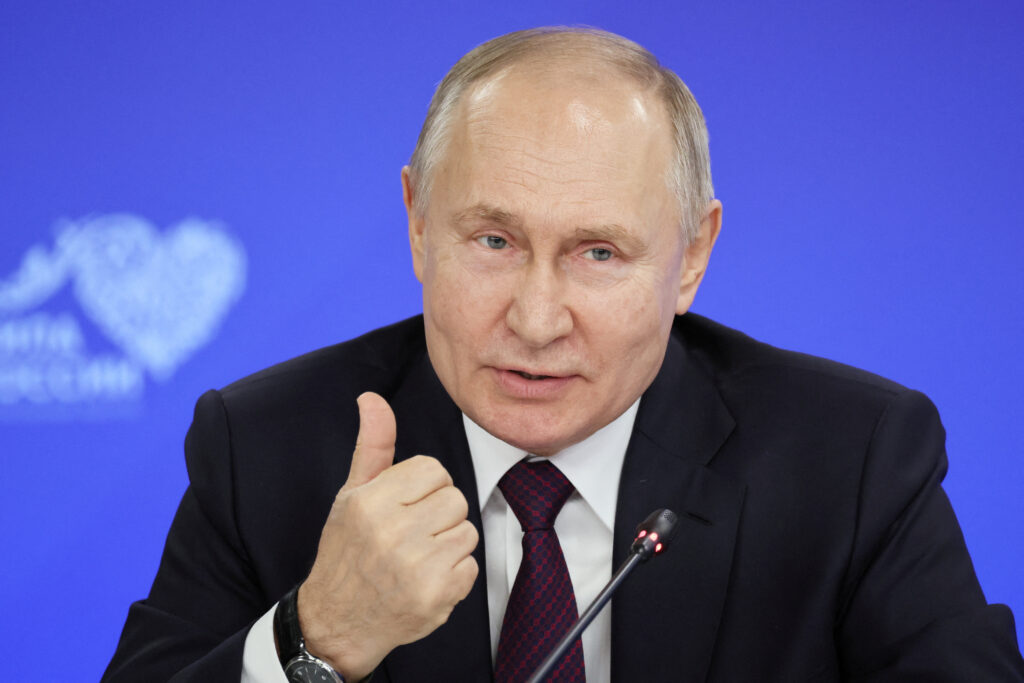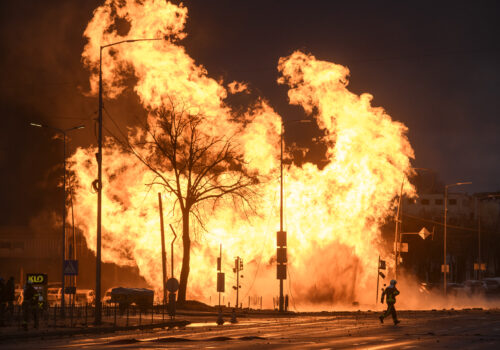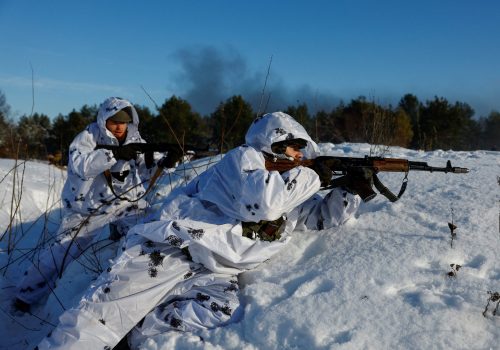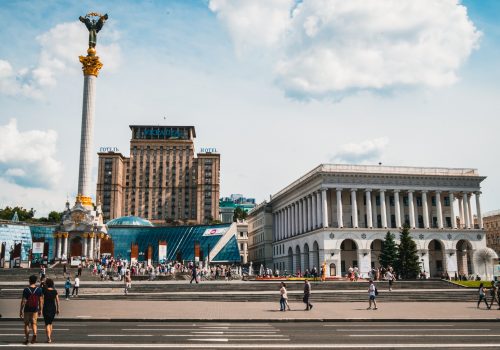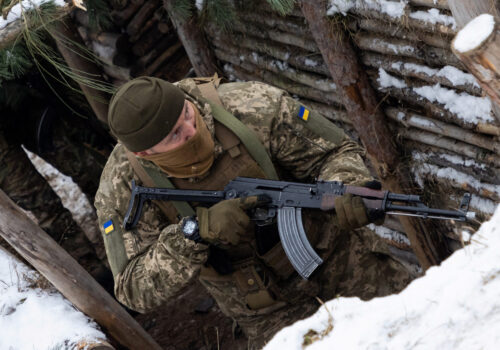
Confident Putin boasts of Russian “conquests” in Ukraine
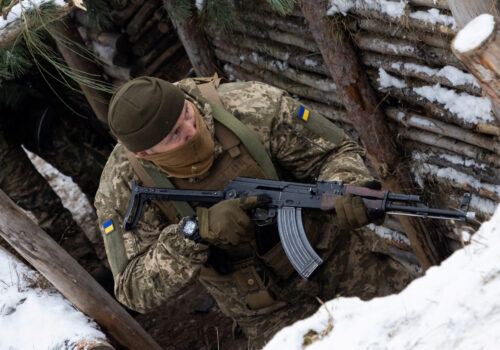
When Vladimir Putin first embarked on the full-scale invasion of Ukraine, he sought to disguise the attack as an act of self-defense while claiming Russia had no interest in occupying Ukrainian territory. “We do not plan to impose ourselves on anyone,” he declared.
With the invasion now fast approaching the two-year mark, the Russian dictator apparently no longer feels the need to dress up his true intentions. Buoyed by a very visible recent weakening in Western resolve, Putin is now openly embracing the language of imperialism and referring to Russian “conquests” in Ukraine.
Speaking at a January 16 meeting of municipal authorities in the Moscow region, Putin dismissed Ukraine’s Peace Formula and expressed his unwillingness to discuss the status of the Ukrainian regions currently under Russian occupation. “As for the negotiation process, this is an attempt to encourage us to abandon the conquests we have made over the past one-and-a-half years. Everyone understands that this is impossible,” he commented.
Stay updated
As the world watches the Russian invasion of Ukraine unfold, UkraineAlert delivers the best Atlantic Council expert insight and analysis on Ukraine twice a week directly to your inbox.
Putin’s revealing reference to conquered Ukrainian lands underlines the imperialistic ambitions at the heart of Russia’s Ukraine invasion. It also further discredits Russian efforts to blame the invasion on imaginary Nazis and a non-existent NATO threat.
On the eve of the invasion, Putin made much of NATO’s post-1991 enlargement and was highly critical of the alliance’s decision to accept former Warsaw Pact countries as members. While Ukraine itself had no realistic prospects of joining the alliance in 2022, Putin claimed the prospect of deepening cooperation between NATO and Kyiv posed an intolerable security threat to Russia.
Putin’s protestations were undermined by his own subsequent lack of concern over Finnish NATO membership. When the Finns responded to Russia’s invasion of Ukraine by abandoning decades of neutrality and joining the alliance, Putin reacted by demilitarizing Russia’s entire 1300 kilometer border with Finland. “If we were a threat, they would certainly not have moved their troops away, even in a situation where they are engaged somewhere else,” commented Finnish Foreign Minister Elina Valtonen in August 2023.
While Russia’s NATO claims do not stand up to scrutiny, Moscow’s entire anti-Nazi narrative is even less convincing. During Putin’s reign, the Kremlin has revived and dramatically amplified lingering Soviet propaganda labeling Ukrainians as Nazis. This has helped to dehumanize Ukrainians in the eyes of the Russian population and generate grassroots support for the current war.
Putin himself has been at the heart of this process, regularly equating expressions of Ukrainian identity with Nazism while insisting Ukrainians are actually Russians (“one people”). Unsurprisingly, when Putin announced his invasion in February 2022, he declared the “de-Nazification” of Ukraine as his main war aim. This was widely understood to mean the eradication of a separate Ukrainian national identity and the imposition of a Russian imperial identity.
The Kremlin’s attempts to portray Ukraine as some kind of fascist threat have played well within the Russian information bubble but have failed to convince international audiences, due largely to the absence of any actual Ukrainian Nazis. Indeed, Ukraine’s far right parties are so unpopular that they actually formed a coalition ahead of the country’s last parliamentary elections in 2019 in a bid to end decades of ballot box failure, but still only managed to secure 2.16 percent of the vote.
Russian propagandists have also been unable to explain how “Nazi” Ukraine could be led by Jewish President Volodymyr Zelenskyy. When quizzed about this obvious inconsistency on Italian TV in May 2022, a clearly flustered Russian Foreign Minister Sergei Lavrov declared that Zelenskyy’s Jewishness was irrelevant as “Hitler also had Jewish blood.” This shameful episode highlighted the absurdity of Russia’s attempts to portray democratic Ukraine as a hotbed of Nazism.
Eurasia Center events

It should now be clear to any objective observer that the Russian invasion of Ukraine has always been an exercise in old-fashioned imperialism. Putin’s most recent statement about Russian “conquests” in Ukraine is not the first time he has adopted the swagger of the conqueror. In summer 2022, he compared his invasion to the eighteenth century imperial conquests of Russian Czar Peter the Great. He has repeatedly claimed to be fighting for “historic Russian lands,” while denying Ukraine’s right to exist.
Putin’s increasingly open imperialism raises serious doubts over the possibility of reaching any kind of compromise agreement to end the war. Recent reports in the international media have suggested that he is “quietly signaling” his readiness for a ceasefire, but it is difficult to see how this could work without legitimizing a land grab that would have profound negative connotations for European stability and international security.
The most obvious question is how far Putin’s imperial ambitions extend. The man himself has proclaimed much of unoccupied Ukraine to be historically Russian, including the country’s main Black Sea port city, Odesa, and the entire southern coastline. This alone is reason enough to believe that any ceasefire along the current front lines of the conflict would merely provide Russia with a pause to rearm and regroup before renewing hostilities.
There are also mounting concerns that if Putin succeeds in Ukraine, he will go further. He has repeatedly stated that the entire Soviet Union was “historical Russia,” while the borders of the old Russian Empire stretched even further. If Putin chooses to apply his weaponized version of Russian imperial history in its broadest sense, the list of potential targets would include Finland, Poland, Belarus, the Baltic states, Moldova, Azerbaijan, Georgia, Armenia, Alaska, and the whole of Central Asia.
Putin’s use of unambiguously imperialistic language is an indication of his growing confidence amid mounting signs of Western weakness. With vital Ukrainian aid packages currently held up in both the US and EU, Putin clearly believes he can outlast the democratic world and achieve his goals in Ukraine. If he is proved right, Ukrainians are highly unlikely to be the last victims of Russian imperial aggression.
Peter Dickinson is editor of the Atlantic Council’s UkraineAlert service.
Further reading
The views expressed in UkraineAlert are solely those of the authors and do not necessarily reflect the views of the Atlantic Council, its staff, or its supporters.

The Eurasia Center’s mission is to enhance transatlantic cooperation in promoting stability, democratic values and prosperity in Eurasia, from Eastern Europe and Turkey in the West to the Caucasus, Russia and Central Asia in the East.
Follow us on social media
and support our work
Image: Russian President Vladimir Putin attends a meeting with the heads of municipalities during the all-Russian municipal forum in the town of Odintsovo in Moscow region, Russia, January 16, 2024. (Sputnik/Sergei Savostyanov/Pool via REUTERS)
